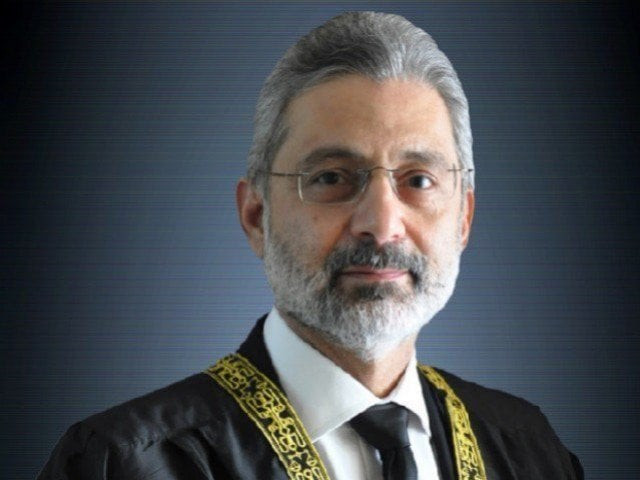No proof Justice Isa's wife, children are his dependents: SC
Justice Isa’s counsel Muneer A Malik objects to 'media trial' against the SC judge

Justice Qazi Faez Isa. PHOTO: FILE
As the 10-judge full-court, led by Justice Umar Ata Bandial, on Monday resumed fifth hearing of Justice Isa petition’s against the reference, the judge’s counsel Muneer A Malik presented his argument.
Malik tried to establish that information regarding the alleged assets was gathered through surveillance and without approval of the competent authority while a media campaign was also started against the judge.
The counsel even called into question legality of the Asset Recovery Unit (ARU), which collected information for filing the presidential reference against the SC judge. He said the government rules of business were silent about the ARU.
The bench members also raised significant questions, which might give an idea as to how the judges were viewing the matter. Justice Syed Mansoor Ali Shah, a member of the bench, noted that the Federal Board of Revenue (FBR) did not proceed under tax laws against an SC judge or his spouse in a matter related to the non-disclosure in wealth statement of family members’ foreign properties.
He also noted that “unauthorised investigation” was conducted to collect information regarding the foreign properties of the SC judge’s family members. The information was collected “without authorisation of the competent authority – which is the prime minister of Pakistan”, he added.
Justice Shah also noted that it was also a mystery as to how the complainant obtained the addresses of the SC judge family’s residences in the United Kingdom. Likewise, it was established that the properties did not belong to Justice Isa but to his family members.
Another judge, Yahya Afridi, questioned whether the FBR served any notice to Justice Isa over non-disclosure of properties. The most significant observation was made by Justice Sajjad Ali Shah, who said the presidential reference against the judge did not say his children and spouse were his dependents.
The presiding judge, Bandial, noted that the money laundering laws related to proceeds of criminal activities. Justice Isa’s counsel; however, stated that the government was applying the National Accountability Bureau (NAB) law on an SC judge, which could not be applied on judges under the law.
The counsel while reading out contents of the reference said the government had not alleged that these were benami properties. Even the government stated that these assets belonged to the SC judge’s wife.
“The government has only alleged that Justice Isa has violated tax law and did not disclose assets of his spouse in his wealth statement in view of Section 116 of Income Tax Ordinance,” he said.
The counsel also contended that the government authorities leaked contents of the reference after May 20. “There has been a calculated media campaign against the SC judge by leaking information related to the reference with the media.”
He alleged that an unelected lawyers’ forum was formed to suppress the voice of genuine lawyers in favour of the petitioner judge. Malik also referred to a press release issued by the law ministry and the ARU jointly about filing of the reference against Justice Isa.
The counsel also referred to newspaper reports to prove that the contents of the presidential reference were leaked to the media. He also questioned the role of the Pakistan Electronic Media Regulatory Authority (Pemra) which facilitated the smear campaign against the SC judge while censoring statements of superior bars in favour of his client.
The counsel said the ARU was not mentioned in the Rules of Business till August 19. Likewise, he revealed that Justice Isa had not given any ‘substantive gift’ to any family member till 2017.
Malik contended that collection of evidences begun, when complaint against the SC judge had not reached the prime minister’s table. The counsel also explained that correspondences among different officials took place on May 10. He described the correspondences among officials as just a “paper trail otherwise information was collected prior to the correspondences”.
Justice Isa’s counsel also tried to establish that the entire information was collected through surveillance. However, Justice Muneeb Akhtar said there was nothing concrete to establish that claim.
On a lighter note, Justice Bandial said one spy was mobile phone, which could always give location of the person carrying it. Earlier, Justice Bandial endorsed Malik’s contention that the Supreme Court was on trial. However, the presiding judge said: “It is not a case of ordinary litigant but a matter related to a fellow judge. We also want to find out how and why the SC is on a trial.”
At the start of the hearing, Hamid Khan, the counsel for superior bars, requested the full court to adjourn the case until next week on account the Supreme Court Bar Association (SCBA) annual election and the upcoming Azadi march which was causing difficulties for some lawyers in reaching the SC.
However, Justice Bandial noted that the apex court was an institution and it must function and cases could not be adjourned on the basis of minor problems. The hearing of the case was adjourned until today (October 29). Malik would give his arguments on effects of Articles 211 and 248 on this case.



















COMMENTS
Comments are moderated and generally will be posted if they are on-topic and not abusive.
For more information, please see our Comments FAQ